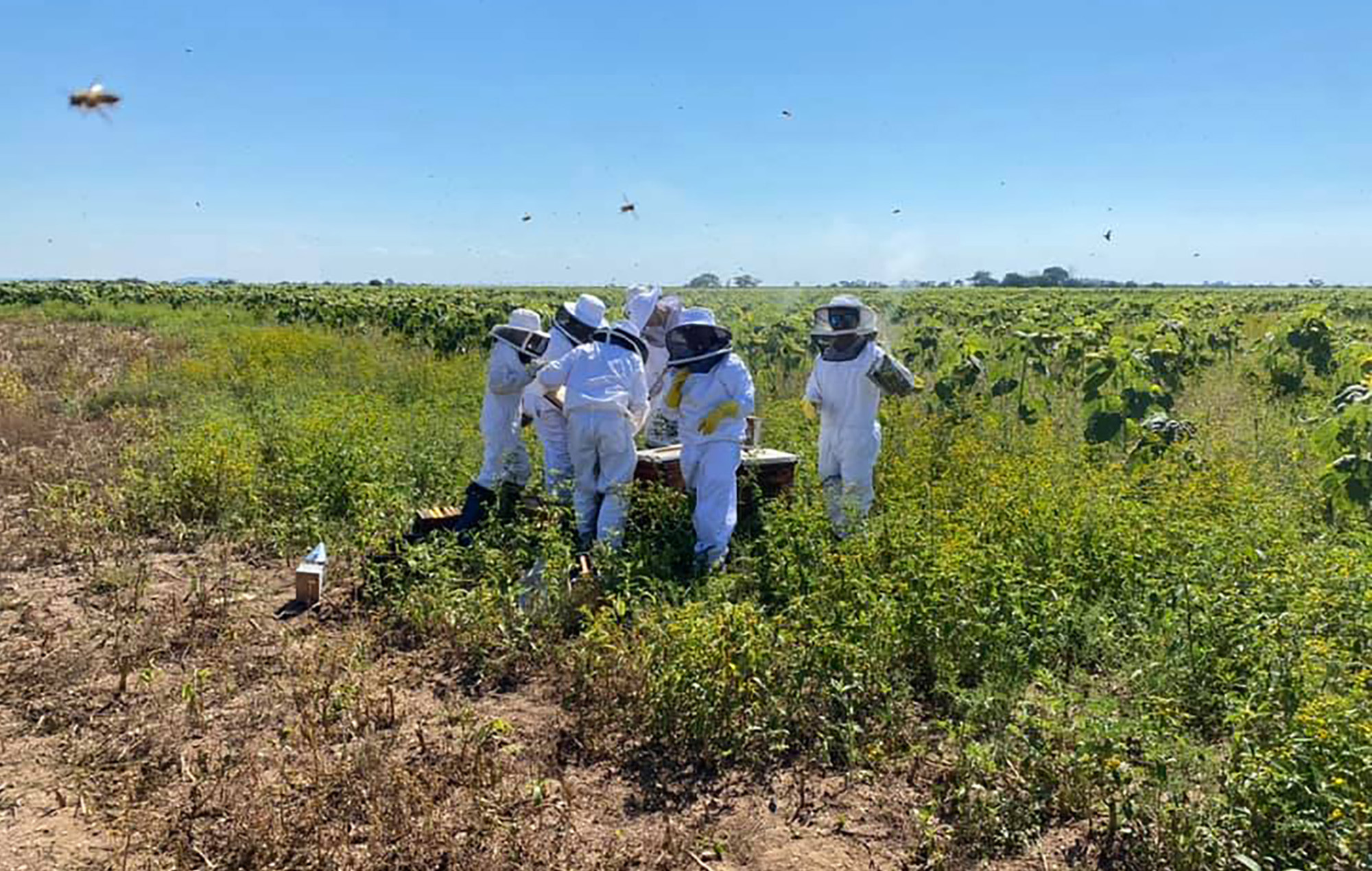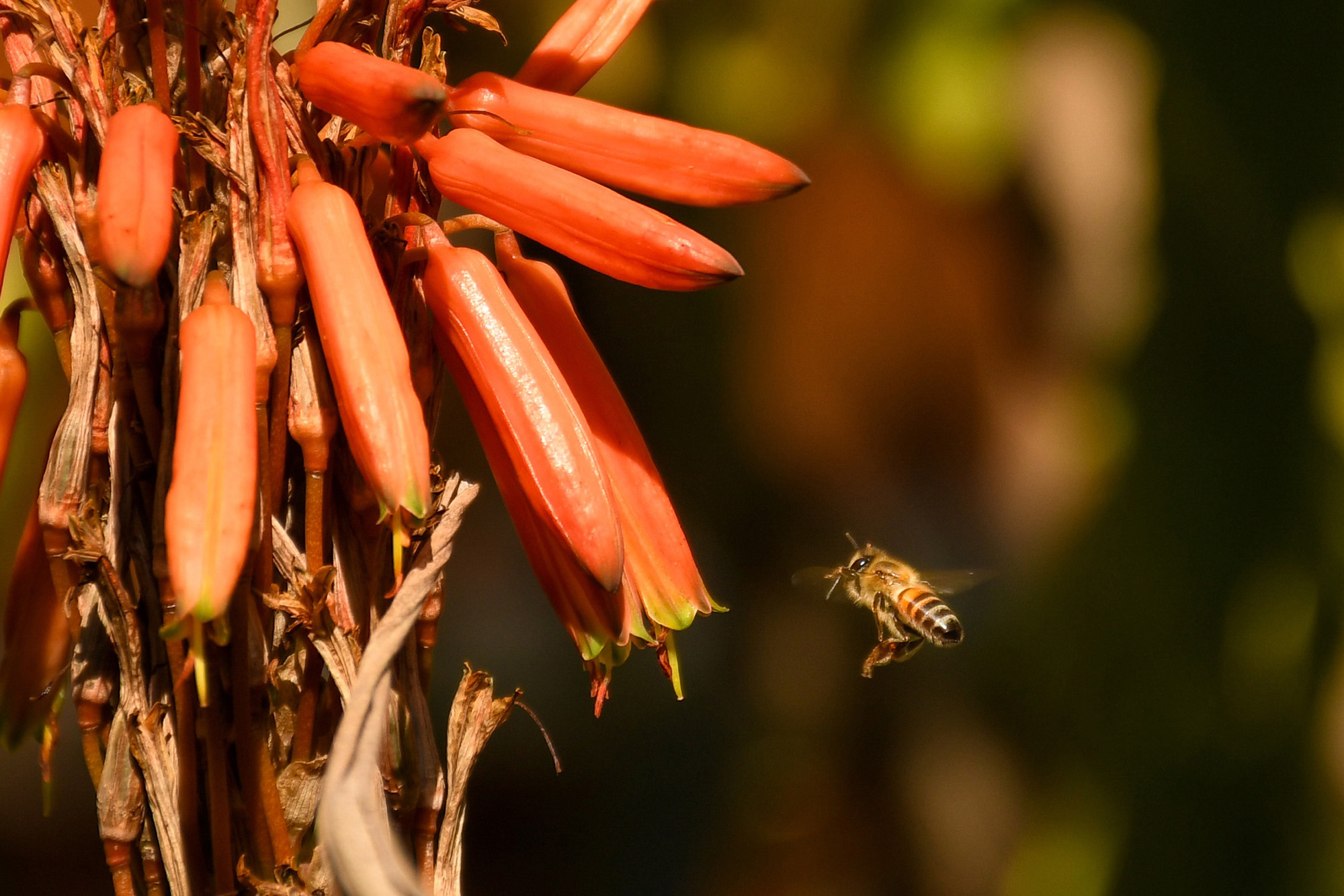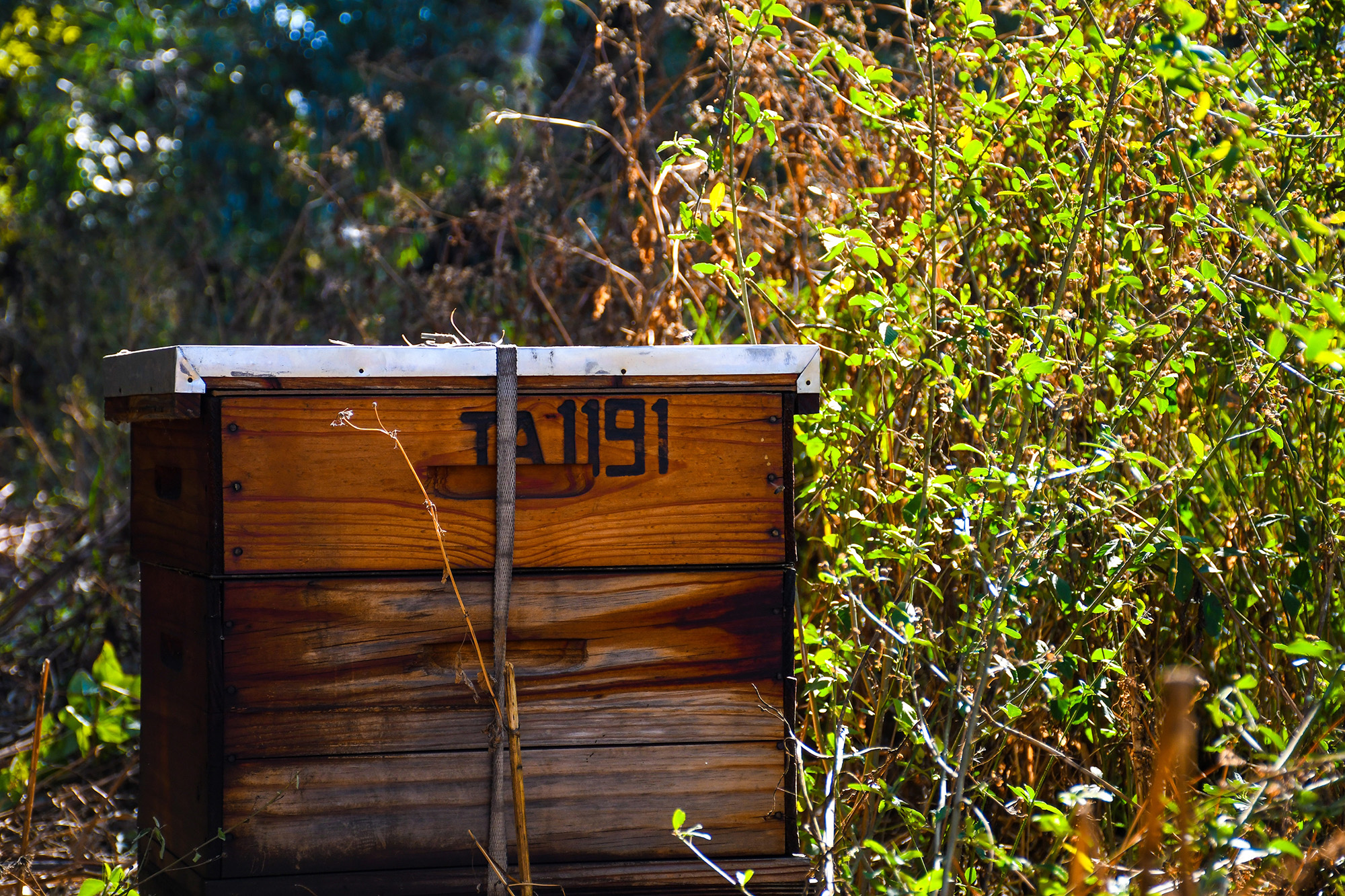On the morning of 27 May 2021, beekeeper Craig Campbell visited his apiary site (an area ideal for bees to forage), to find that overnight, 235 of his bee boxes had been destroyed. The thieves cut out the honey, destroying the hives, equipment and killing the broods in the process.
The few bee colonies that survived the destructive vandalism lost their home. Campbell told Daily Maverick that the total loss of the equipment, bee colonies and honey amounts to about R700,000.
“How do you recover from that, you know?” says Campbell, who’s been a bee farmer for more than 30 years. “It’s a massive knock to us. I mean, we’re carrying on for now, but to me, the writing’s on the wall, I’m closing up.”
Bee farmer Craig Campbell visited his apiary site to find that overnight 235 of his bee boxes had been destroyed. This is not an isolated occurrence - the vandalism and theft of bees & honey is increasing in SA, which threatens our food security. Story coming soon @dailymaverick pic.twitter.com/0X7GzIgoIQ
— Julia Evans (@Julia_J_Evans) June 22, 2021
Unfortunately, this is not an isolated occurrence. Campbell knows several beekeepers who’ve experienced the same thing and who have either had to close down or are considering closing.
“We have a massive problem with vandalism and theft,” says Kai Hichert, chairman of the Southerns Beekeeping Association and board member of the South African Bee Industry Organisation (Sabio).
Hichert has experienced several instances where his bee boxes were vandalised or thieves would carry off several boxes. He told Daily Maverick that while there has always been theft and vandalism involving bees, in the last year more and more cases have been reported.
Hichert, who is also the chief beekeeper at Simplie Honey, says, “What they do is come and cut out the honey, straight into buckets. Then they tend to sell the honey on places like Facebook. Often you’ll see a guy in the East Rand selling a couple hundred kilos of honey, but he doesn’t own any hives.”
Mokgadi Mabela, Pretoria beekeeper and owner of Native Nosi, recently shared a video on Twitter showing her vandalised bee boxes at one of her apiary sites.
“The honey, as well as the brood, as well as all the frames inside the actual box — they were gone. It was only a small cluster of bees that were left,” Mabela told Daily Maverick. This is the fourth time Mabela has been the victim of theft or vandalism of her honey or bee boxes.
? BEEHIVE VANDALISM ?
This #NativeNosi #apiary has been tampered with, hives open and funny liquid poured inside our hives, and this particular hive completely stripped off everything, wooden frames thrown all over the place. Remaining bees stranded. The anxiety ? the loss ? pic.twitter.com/jCxlo2sv22
— Native Nosi (@NativeNosi) June 11, 2021
The ongoing theft and vandalism are further reducing an already endangered insect group.
“I can say that we are experiencing a global bee population decline,” says Mabela. “And that is obviously going to have a direct impact on our food and on our ecosystem.
“We are developing more areas faster than we are planting alternative accommodation for the bees.”
Dr Annalie Melin, a postdoctoral research fellow at the Centre for Statistics in Ecology, Environment and Conservation at the University of Cape Town’s Faculty of Science, published a research paper in 2019 on the taxonomy of the South African bee.
 Honey from Kai Hichert’s company, Simplie Honey. ‘Honey is literally a byproduct for us,’ says Craig Campbell. (Photo: Julia Evans)
Honey from Kai Hichert’s company, Simplie Honey. ‘Honey is literally a byproduct for us,’ says Craig Campbell. (Photo: Julia Evans)
In the paper, Melin states that bees “appear to be facing numerous threats globally, from habitat destruction, diseases and climate change, and are considered an insect group especially vulnerable to extinction”.
So what are the repercussions of losing bees?
The impact of this doesn’t just affect the beekeeper’s livelihood and the bee industry as a whole (more and more bee farmers are closing up), but has ecological repercussions, threatens food security and has a knock-on effect on the economy.
Threat to biodiversity and ecology
Bees support our biodiversity and ecosystems, pollinating 40%-70% of indigenous flowering plants.
This in turn affects ecology, threatening other animals’ livelihoods.
“The thing that people forget is that bees pollinate flowers and trees,” says Mabela. “And species depend on certain plants that the bees pollinate. Other animals, even if they are not herbivores — like lions, and leopards — depend on trees for shelter, for their cubs and things like that.
“So it’s a whole ecosystem that’s affected by this... by what you’re destroying, what you think is only a hive.”
Threat to food security
Bees are the world’s largest crop pollinators. The Western Cape government reported that more than 50 types of crops rely on bees’ pollination.
Hichert told Daily Maverick that bees are responsible for pollinating 70%-80% of the food we eat. Macadamias, avocados, apples, cherries, sunflowers, kidney beans, pumpkin, watermelon, lychees and mangoes are just some of the crops that rely on pollination.
“So without bees, we won’t have fruits, we won’t have vegetables, we won’t have seeds, we won’t have nuts, basically,” says Mabela.
“Honeybees are the biggest food pollinators. We do have other pollinators, but bees are the biggest food pollinators that we have on the planet.”
 Kai Hichert and his team of beekeepers harvest honey from his hives at a sunflower farm in Gauteng. (Photo: Kai Hichert)
Kai Hichert and his team of beekeepers harvest honey from his hives at a sunflower farm in Gauteng. (Photo: Kai Hichert)
“People are all so focused on the honey,” says Campbell, “but if this type of theft and vandalism doesn’t stop, the whole food security will go, because we need pollination on crops. Honey is literally a by-product for us.
“The basic thing is, if nothing happens, food security or the country is buggered.”
Even without vandalism and theft, there is a massive shortfall of pollination requirements in SA. For example, Hichert says that there are about 50,000 hectares of macadamias planted in South Africa. You need four hives minimum per hectare to pollinate the nuts, so 200,000 colonies to cover the macadamia industry alone. But there are only 180,000 registered colonies in the country.
Threat to economy
South Africa is the largest producer of macadamia nuts in the world. A decline in bee populations, or in the bee industry, affects the South African economy because without bees, we can’t trade crops.
“These macadamia farmers, they need us every single year to place our beehives there so that we can provide the pollination,” says Mabela. “So I know that with nuts, the bees are vital for the farmers to realise a good yield in terms of crop quality and quantity.”
Campbell says, “Unless government takes us seriously, more and more beekeepers are just going to pick up and say, ‘what’s the point?’ ”
Security a major problem
The main problem bee farmers face when it comes to vandalism and theft is that it is incredibly difficult to secure the areas where bee boxes are placed. Boxes are either located on apiary sites, which are open spaces that have forage (like blue gums) which bees can feed off, or they are placed on crop farms for pollination.
Campbell says that beekeeping on a large scale means you can’t keep bees in urban areas — they have to be in rural areas. “We need to put the bees where there’s forage, to keep them feeding in the area.”
Hichert had just moved his hives from sunflower farms after the pollination season ended. “We were totally unprotected... The farms are miles and miles of sunflowers and we try to hide our hives as much as possible, but the guys find out about them.”
“I’ll give you an idea,” says Hichert. “I had 60 hives in one spot on the farm hiding among the sunflowers, hoping the guys wouldn’t see them. Sixty hives, R3,000 a super [part of the box where they harvest the honey] — that’s R180,000 standing in the middle of nowhere.”
Mabela says, “It’s very difficult to get a safe spot for your bees that also has food. So I think it’s one of the challenges that make us vulnerable as beekeepers.”
Like many beekeepers, Mabela doesn’t have her own farm — she relies on other people’s crop farms or forage apiaries to host the bee boxes, which are often unprotected.
However, Mabela says that even on farms that have security, theft and vandalism still occur.
 A bee collects nectar and pollen from a flower, at an apiary site. Bees pollinate fauna and flora and food crops. Destroying hives affects biodiversity and food security. (Photo: Julia Evans)
A bee collects nectar and pollen from a flower, at an apiary site. Bees pollinate fauna and flora and food crops. Destroying hives affects biodiversity and food security. (Photo: Julia Evans)
“We’ve had our hives on very sophisticated farms where there are actually security fences. People find ways to break those fences and make their way into the farm to specifically kill the beehives.
“They don’t go there to steal whatever it is that we’re pollinating... they’re not stealing the fruit or the avos or the macadamia nuts, but the bees or honey.”
Additionally, beekeepers have to pull their hives off crop farms and on to an apiary site when the farmers spray pesticides on their crops.
“Where do you take your bees to safe forage sites where nothing will happen to them?” Hichert asks.
“You need to be able to put your bees down where they’re getting enough food, and hopefully safe from being vandalised.”
Beekeepers are in desperate need of people to offer potential apiary sites.
“I think more people who have land they are not fully using need to open their doors to assist beekeepers,” says Mabela.
“You can just get into a gentlemen’s agreement with them, giving them some honey from whatever the bees make there. But more than anything, people need to realise that all of us need bees.”
Possible solutions
Bees are not regarded as livestock, which means the authorities don’t take it seriously when beekeepers report that their bees or hives have been stolen or destroyed. One solution would be to change the law so that these occurrences are seen as livestock theft, which has serious repercussions.
“We’ve got to change the law,” says Hichert, “If I steal your cow, I’m going to jail for 10 years. If you steal my bees, you get out of it. That’s the problem.”
“Nobody cares about an insect… especially not the criminals,” says Campbell, “but if they [government] see it as livestock… at least maybe the police will take it more seriously.”
 One of Kai Hichert’s bee boxes at a Blue Gum apiary. His registration number is on the side. Beekeepers have to register their colonies with the Department of Environment, Forestry and Fisheries. (Photo: Julia Evans)
One of Kai Hichert’s bee boxes at a Blue Gum apiary. His registration number is on the side. Beekeepers have to register their colonies with the Department of Environment, Forestry and Fisheries. (Photo: Julia Evans)
The problem Hichert and other beekeepers have had in the past is that when they do manage to take a case to court, the defence argues that beekeepers can’t prove they own the bees.
“All our boxes are marked with a registration number on the side. Thieves will take an angle grinder and remove that,” says Hichert.
Additionally, as beekeepers catch the bees wild with a catch box, lawyers claim they don’t own them.
Food for thought
Bee populations are in decline. Bee theft is on the rise. This has serious consequences.
But perhaps one has to consider that the recent spike could be attributed to a lack of knowledge about the consequences for food security and the economy. Also, the current tough economic times are causing people to become more desperate.
“The lockdown has put a lot of people out of work. So no matter how much education you do, no matter how secure your beehives are, somebody who is operating from a hungry stomach is not going to care about all those things. They need a plan, now.
“We’ve got a lot of desperate people… this doesn’t justify things because at no point are you justified to steal or do harm to somebody else’s belongings. But it’s not a factor we can ignore,” says Mabela.
What’s become clear in recent times is that social justice and environmental justice are intertwined. If one is affected, the other will suffer. If bee populations decline, food security is at risk. If unemployment is alleviated, the thefts and vandalism might decrease. DM




 One of Kai Hichert’s bee boxes at a Blue Gum apiary. His registration number is on the side. Beekeepers have to register their colonies with the Department of Environment, Forestry and Fisheries. (Photo: Julia Evans)
One of Kai Hichert’s bee boxes at a Blue Gum apiary. His registration number is on the side. Beekeepers have to register their colonies with the Department of Environment, Forestry and Fisheries. (Photo: Julia Evans) 